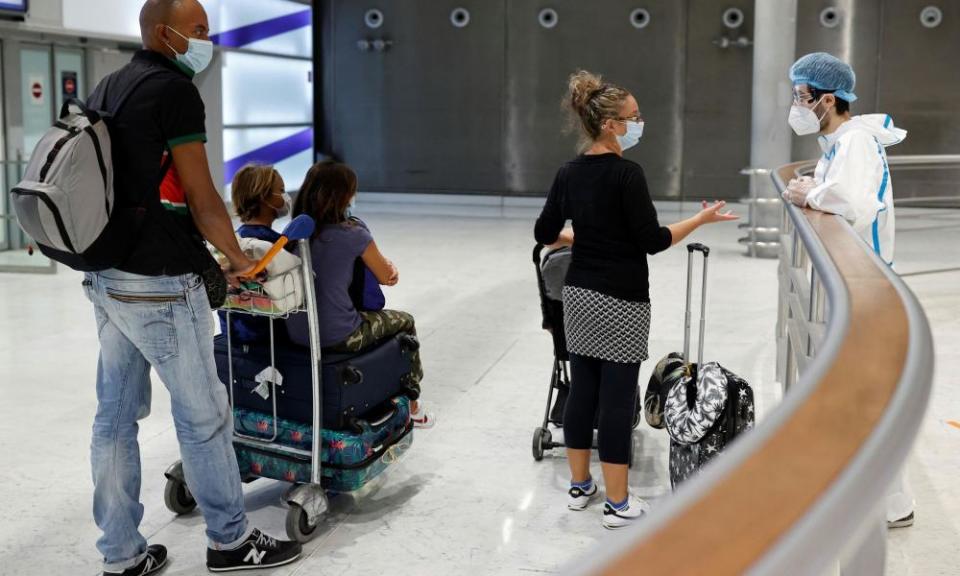Coronavirus cases rise 54% in mainland France in a week

Health authorities in France have confirmed a “marked increase” of 54% in the number of coronavirus cases across the French mainland since last week.
The rise covered all age groups but the public health authority said the rise was particularly worrying in those aged between 20 and 30. There was also an increase in the number of patients admitted to hospital with Covid-19, and the figures for those requiring intensive care went up by one – the first time the figure has increased in 16 weeks.
As France prepared for a heatwave, people were being urged to keep their face coverings on despite the soaring temperatures, expected to reach 41C (106F) in some areas.
The number of new cases in the previous 24 hours was 1,377, only slightly fewer than the previous day, which was a record since May, and the number of clusters under investigation rose by 10 to 151. There were 16 deaths in hospital in the previous 24 hours, taking the total number of deaths in France attributed to coronavirus to 30,254.
In its report for 20-26 July, Santé Publique France said the number of positive tests for coronavirus in France, including overseas departments, had risen for the third week in a row and the increase was “significant”. Just under 458,000 patients were tested and 6,407 found to be positive for the virus, an increase of 44% on the number of positive tests the previous week.
Of those tested, just under 440,000 were resident in mainland France, known as l’Hexagone, and 5,592 tested positive, an increase of 54% on the number of positive tests the previous week. In short, the number of tests carried out increased by 27%, while the number of positive results increased by 54%.
“In week 30 the increase in new positive cases is much higher than the increase in the number of tests carried out,” it declared.
More than half (51%) of those who tested positive showed no symptoms. Of those testing positive 69% were aged 15-44 and of those the biggest increase was among 20- to 25-year-olds.
The R-number – the number of people one person with the virus will infect on average – rose from 1.35 to 1.42.
The increase in number of clusters was said to be a result of large family gatherings as well as public and private events.
Santé Publique France said the rise was also due to the “drop in the systematic adoption of prevention measures (keeping a minimum 1-metre distance, not shaking hands and stopping embraces)”.
Meanwhile, thousands of demonstrators were expected to gather in Berlin at the weekend to protest against restrictions introduced to dampen the spread of coronavirus.
Under the umbrella title “End of the pandemic – the Day of Freedom”, diverse groups from the extreme left and right, including anti-vaxxers, Holocaust deniers, and conspiracy theorists who believe the virus has been imposed by an elite in order to gain power, are due to hold dozens of individual protests across the German capital.
Police and lawmakers have urged participants to observe physical distancing rules and to wear face coverings, amid evidence that the frequency of the virus is increasing once again.
One group of demonstrators has suggested “storming the Reichstag”, the German parliament building. Others have rejected the idea, arguing it could bring the protest into disrepute. More than 1,500 police are expected to be on duty, with about 22,000 protesters due to take part from across Germany, according to Berlin’s interior ministry.
The main gathering is expected to take place at the Brandenburg Gate in the centre of Berlin, before participants march down the wide 17. Juni boulevard to the Victory column. Other protests are planned for elsewhere in the city.
The anti-coronavirus restriction demonstrators had been thought to be in decline since Germany began to gradually relaxed its lockdown rules after reducing the number of active infections.
The demonstrators draw from a range of interest groups, including followers of the US group QAnon – an online conspiracy theory cult focused on the idea of a “deep state” dominance, one of whose heroes is the US president, Donald Trump, and the Querdenken (“lateral thinking”) alliance, whose followers wear tin-foil pendants and are against a coronavirus vaccine, and have gained more traction the longer the pandemic has continued.
Its sympathisers have used social media to gain support. This weekend’s events are supposed to mark the first time the various groups will actively, rather than accidentally, come together.
One of its figureheads, a celebrity vegan cook called Attila Hildmann, has been banned from speaking at the rally due to the defamatory, far-right rhetoric he has used at previous protests.
Nikolai Nerling, a prominent Holocaust denier who broadcasts his views on YouTube, is expected to be present. The far-right NPD has also announced it will participate.
One of the protesters’ broad demands is for the German parliament to call fresh elections in September, a year ahead of schedule, so that voters have the opportunity to bring down what is referred to as the “corona emergency government” of the chancellor, Angela Merkel.

 Yahoo News
Yahoo News 